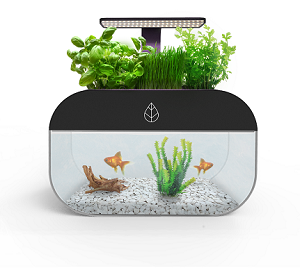Solving modern day challenges with a thousand-year old method
Ecobloom - Global Goals 11, 12 & 13
Have you ever have tried to find that magical amount of water that makes your basil thrive, only to miss watering it for one day and come home to a withering mess. Anyone who has tried keeping herbs alive knows how common it is for them to wither and die as soon as you look away. Using a thousand-year old method, Ecobloom has come up with a solution.
Based on aquaponics, a thousand-year old agricultural method, Ecobloom has developed a modern system that makes it possible for anyone to grow herbs and vegetables in an organic, climate-smart system in their own home. Their solution consists of a smart miniature greenhouse, which together with a self-sustaining aquarium enables you to grow greens locally, all year round. The greens get water and nutrients from the aquarium, while keeping the water clean and fresh for the fish.

The team behind Ecobloom is made up of three dedicated KTH Students, all sharing the same vision: to help people live healthier lives, while contributing to a more sustainable world. Hamza Qadoumi, Emil Jansen and Juan Jose Blasco started Ecobloom with the aim of educating people in sustainable farming techniques, and in how our food and water consumption affects the world. Ecobloom wants to create a clearer connection between food and consumer to create a more sustainable world for future generations.
- We aim to contribute to solving several of the global goals, says Hamza Qadoumi. By year 2050, 70% of all people are expected to live in cities which means we need solutions to meet the new needs that arise. We don’t think Ecobloom can solve all the world’s problems, but we can definitely contribute.
Educating people in sustainable farming is one of Ecobloom’s core pillars. By creating awareness of the consequences that food production and consumption has on our society, they believe that they can give people higher respect for what they eat. In that way, they can contribute to the Global Goals 11, Sustainable cities and communities, 12, Responsible consumption and production, and 13, Climate Action.
- Many people are aware of the problems that exist today, but often don’t know where to start, or how to decrease their personal impact, Hamza Qadoumi continues. We can offer them a tool and a possibility to start making a difference, both for themselves but also for their surroundings.
Ecobloom has recently received VFT-0 funding from KTH Innovation to continue developing their idea. What does that mean for the company?
- It’s amazing, says Hamza Qadoumi. It means we can continue growing and working toward our vision. It also proves that what we do in Ecobloom matters. We are launching a kickstarter campaign before summer, and this funding will be of great help in that. The confidence shown in us is incredibly appreciated, and will definitely give us a boost in the right direction. The competence we have access to from KTH Innovation is also invaluable. To be in an environment of likeminded people is so motivating!

